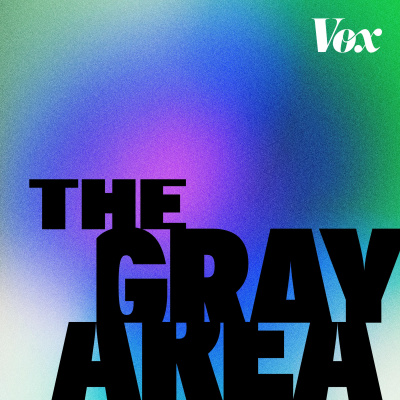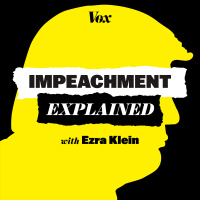Synopsis
Ezra Klein brings you far-reaching conversations about hard problems, big ideas, illuminating theories, and cutting-edge research. Want to know how Mark Zuckerberg intends to govern Facebook? What Barack Obama regrets in Obamacare? The dangers Yuval Harari sees in our future? What Michael Pollan learned on psychedelics? The lessons Bryan Stevenson learned freeing the wrongly convicted on death row? The way N.K. Jemisin imagines new worlds? This is the podcast for you. Produced by Vox and the Vox Media Podcast Network.
Episodes
-
The climate crisis is an oceans crisis
04/11/2019 Duration: 01h12minWelcome to episode 2 of our climate cluster. The more I prepared for this series, the more I realize there was a big blue gap in my understanding of climate change. Oceans cover 70% of the earth, absorb 93% of the heat from the sun, and capture 30% of the carbon dioxide from the atmosphere. Forty percent of the world’s population lives within 60 miles of the coast, and half a billion people rely on oceans as their primary food source. As go the oceans, so goes humanity. Dr. Ayana Elizabeth Johnson is the founder of the Urban Ocean Lab and the Ocean Collectiv, she’s held positions at the NOAA and the EPA, and was named by Outside Magazine as the most influential marine biologist of our time. And she’s able to do something a lot of people aren’t: communicate not just the science of climate change from the ocean perspective, but the role oceans play in the human story. This is not a dry, complex disquisition on climate science. This is a vivid tour of the way oceans shape our lives, and the costs and consequence
-
We live in The Good Place. And we’re screwing it up.
28/10/2019 Duration: 01h25minWelcome to the first episode of our climate cluster. This isn’t a series about whether “the science is real” on climate change. This is a series about what the science says — and what it means for our lives, our politics, and our future. I suspect I’m like a lot of people in that I accept that climate change is bad. What I struggle with is how bad. Is it an existential threat that eclipses all else? One of many serious problems politics must somehow address? I wanted to kick off the series with someone who knows the science cold. Kate Marvel is a research scientist at NASA’s Goddard Institute for Space Studies and a professor at Columbia University’s Department of Applied Physics and Mathematics. But Marvel isn’t just a leading climate scientist. She’s also unique in her focus on the stories we tell each other, and ourselves, about climate change, and how they end up structuring our decisions. We discuss: - How a climate model actually works - Why this is the good place - Why there is so much variation in cli
-
Neoliberalism and its discontents
24/10/2019 Duration: 01h32min“Neoliberalism” is one of the most confusing phrases in political discourse today. The term is often used to describe the market fundamentalism of thinkers like Milton Friedman and Frederich Hayek or politicians like Ronald Reagan and Margaret Thatcher. At the same time, critics often place more progressive figures like Bill Clinton, Barack Obama, and even Elizabeth Warren under the neoliberal banner. This raises an important question: what the hell is neoliberalism? I decided to bring on two guests today to help us answer that question. Wendy Brown is a professor of political theory at UC Berkeley, author of Undoing the Demos and In the Ruins of Neoliberalism, and one of the foremost critics of neoliberalism, not only as a set of economic policies but a “governing rationality” that infects almost all aspects of our existence. Noah Smith is an economist, a columnist at Bloomberg, and is known for his robust defenses of some (though not all) neoliberal positions, which earned him the prestigious title of Chief
-
The four words that will decide impeachment
21/10/2019 Duration: 54minHey EK Show listeners! Something different today. The first episode of my new podcast: Impeachment, Explained. This was the week of confessions. Acting White House Chief of Staff Mick Mulvaney admitted to a Trump administration quid quo pro with Ukraine, with cameras rolling. EU Ambassador Gordon Sondland confirmed that President Trump made Rudy Giuliani the hinge of America’s Ukraine policy. And then the administration announced that the location for the upcoming G7 summit: Trump’s own resort in Doral, Florida. We break down the three stories that mattered most in impeachment this week. And then we dig into the four words that will shape the entire impeachment fight: “High Crimes and Misdemeanors.” What did they mean when they were added to the Constitution? How have they been interpreted through American history? And do Trump’s acts qualify? Listen to the first episode here, and subscribe to Impeachment, Explained, on Apple Podcasts, Spotify, Stitcher, Overcast, Pocket Casts, or your favorite podcast app to
-
We don’t just feel emotions. We make them.
17/10/2019 Duration: 01h33minHow do you feel right now? Excited to listen to your favorite podcast? Anxious about the state of American politics? Annoyed by my use of rhetorical questions? These questions seem pretty straightforward. But as my guest today, psychologist Lisa Feldman Barrett, points out there is a lot more to emotion than meets the mind. Barrett is a superstar in her field. She’s a professor of psychology at Northeastern University, holds appointments at Harvard Medical School and Massachusetts General Hospital, and has received various prestigious awards for her pioneering research on emotion. Her most recent book How Emotions Are Made: The Secret Life of the Brain argues that emotions are not biologically hardwired into our brains but constructed by our minds. In other words, we don’t merely feel emotions — we actively create them. Barrett’s work has potentially radical implications. If we take her theory seriously, it follows that the ways we think about our daily emotional states, diagnose illnesses, interact with frie
-
How politics became a war against reality
14/10/2019 Duration: 01h27minIn his brilliant 2014 book Nothing is True and Everything is Possible, Soviet-born TV producer turned journalist Peter Pomerantsev described 21st-century Russia as a political anomaly. He wrote about “a new type of authoritarianism” that waged war on reality by peddling conspiracy theories, disregarding the notion of truth, and framing all political opposition as the enemy of the people. Sound familiar? Upon leaving Russia, Pomerantsev found that the world around him had been infected with the same post-truth disease he had diagnosed in Moscow. The war against reality had spread across the globe, from London and Washington, DC, to Mexico City and Manila, Philippines. All over the place, the same values that had once defined liberal democracy — free speech, pluralism, the open exchange of ideas — were now being used to undermine it. This development became the centerpiece of his dizzying new book This is Not Propaganda, and it is the focal point of our conversation. We discuss: - How information went from bein
-
The loneliness epidemic
10/10/2019 Duration: 01h18minAs US surgeon general from 2014 to 2017, Vivek Murthy visited communities across the United States to talk about issues like addiction, obesity, and mental illness. But he found that what Americans wanted to talk to him about the most was loneliness. Loneliness isn’t simply painful, it’s lethal. Several meta-studies have found the mortality risk associated with loneliness is higher than that of obesity and equivalent to smoking 15 cigarettes per day. So, Murthy decided to label loneliness a public health “epidemic,” a term that medical professionals don’t throw around lightly. Murthy’s advocacy has changed the national discourse around loneliness. However, this isn’t a conversation simply about loneliness as a public health problem: It is about loneliness as a deeply painful lived experience — one that both Murthy and I are all too familiar with. There’s a lot in this conversation. Murthy’s explanation of how loneliness acts on the body is worth the time, all on its own. It’ll change how you see the relations
-
Ibram X. Kendi wants to redefine racism
07/10/2019 Duration: 01h29minRacism is one of the most morally charged words in the English language. It is typically understood as a form of deep inner prejudice — something that people actively feel and consciously express. My guest today, Ibram X. Kendi, wants to redefine racism. He defines the idea simply: support for policies that widen racial inequality. Kendi is a professor of African-American Studies and director of the Antiracist Policy Center at American University. His National Book Award-winning Stamped From the Beginning argued that racist policies beget racist ideas, not the other way around. His new book, How to Be an Antiracist, is a continuation of that project. It focuses on racism as a structural ecosystem that black people face, not a prejudice that white people feel. The implications of this redefinition are far-reaching. Are you a racist if you loathe people who aren’t of your race but don’t want to pass policy on it? Are you a racist if you tried to narrow racial inequality but your program backfired? In this conve
-
Malcolm Gladwell’s Stranger Things
03/10/2019 Duration: 01h35minMalcolm Gladwell’s work is nothing short of an intellectual adventure. Sometimes, as in his podcast Revisionist History, he takes something small and mundane — a hockey statistic, a semicolon, a verbal tic — and draws a broad, sweeping conclusion that shatters your worldview. Other times, as in his new book Talking to Strangers, he takes something big and contentious — the death of Sandra Bland, the wrongful conviction of Amanda Knox, the ponzi scheme of Bernie Madoff — and produces insights that challenge conventional wisdom, leaving you wondering how you missed what he saw all along. In either case, once you’ve experienced what Gladwell has to say, you can never see things in quite the same way again. This conversation is an adventure of its own. We cover everything from the secrets behind Gladwell’s creative process to the basic social ingredient that undergirds all of modern society to the story of how an entire field office of the CIA got infiltrated by Cuban spies — and what that teaches us about hu
-
An inspiring conversation about democracy
30/09/2019 Duration: 01h29minDanielle Allen directs Harvard’s Edmond J. Safra Center for Ethics. She’s a political theorist, and a philosopher, and the principal investigator of the Democratic Knowledge Project. I talk about democracy a lot on this show, but it’s her life’s work. I've tried a bunch of different descriptions here, but they fail the conversation. I loved this one. Don’t make me cheapen it by describing it. Just download it. References: Talking to Strangers by Danielle Allen "Building a Good Jobs Economy" by Dani Rodrik and Charles Sabel Book recommendations: "Politics and the English Language" by George Orwell "What America Would Be Like Without Blacks" by Ralph Ellison Men in Dark Times by Hannah Arendt Want to contact the show? Reach out at ezrakleinshow@vox.com News comes at you fast. Join us at the end of your day to understand it. Subscribe to Today, Explained We are conducting an audience survey to better serve you. It takes no more than five minutes, and it really helps out the show. Please take our survey here Lear
-
Samantha Power’s journey from foreign policy critic to UN ambassador
26/09/2019 Duration: 01h31minSamantha Power reported from the killing fields of Bosnia. She watched a genocide that could’ve been stopped years earlier grind on amidst international indifference. What she saw there led to A Problem From Hell, her Pulitzer-prize winning exploration of why the world permits genocide to happen. She emerged as a fierce critic of America’s morally lax foreign policy, a position that led to a friendship with Barack Obama, and then a series of top jobs in his administration, culminating in ambassador to the UN. Power’s new book, The Education of an Idealist, is a memoir of this journey. It is rare that an outspoken critic of the foreign policy establishment becomes so powerful within it. But that’s what makes Power’s career, and the lessons she learned, so interesting. In this conversation we discuss: - What causes ordinary people to participate in genocide - Why policymakers so often fail to respond to genocide before it is too late - Whether foreign policy decisions are too restrained by the overreaches and m
-
When meritocracy wins, everybody loses
23/09/2019 Duration: 01h29minIn The Meritocracy Trap, Daniel Markovits argues that meritocracy — a system set-up to expand opportunity, reduce inequality and end aristocracy — has become exactly what it was set up to combat: a mechanism for intergenerational wealth transfer that leaves everyone worse off in the process. Markovits isn’t only challenging a system; he is challenging the system that I (and probably most of you) have been part of for our entire lives. For better or worse, Meritocracy is the water we swim in. We implicitly accept its values, practices, arguments, and assumptions because they govern our everyday lives. This interview was a chance for me to exit the water. Maybe it will be for you as well. Book recommendations: The Rise of the Meritocracy by Michael Young The Race between Education and Technology by Claudia Goldin and Lawrence F. Katz "Technical Change, Inequality, and The Labor Market" (article) by Daron Acemoglu Want to contact the show? Reach out at ezrakleinshow@vox.com News comes at you fast. Join us at th
-
Nikole Hannah-Jones on the 1619 project, choosing schools, and Cuba
19/09/2019 Duration: 01h42min“The truth is that as much democracy as this nation has today” writes Nikole Hannah-Jones “it has been borne on the backs of black resistance.” Hannah-Jones is an investigative journalist at the New York Times Magazine, the winner of MacArthur Genius Grant (among countless other awards), and, most recently, the creator of the New York Times’ 1619 project, which explores the ways slavery shaped America. As Hannah-Jones points out, no group in American history has more to teach us about what it means to live out the practice of democracy, in its most difficult and graceful form, than African-Americans. We also discuss: - The economics of slavery, and the role of the cotton gin - Why it took a civil war to end slavery in America, but not elsewhere - What it means to love a country that doesn’t love you back - Whether busing worked - Why Southern schools are the most racially integrated in the US - The long-term effects of school integration - Whether class-based policies can solve racial inequity - What America
-
Randall Munroe, the genius behind XKCD
16/09/2019 Duration: 01h25minI’m not usually a fanboy on this podcast, but this episode is the exception. I love the web-comic XKCD. I’ve had prints of it hanging in my house for years. It’s nerdy and humane, curious and kind. And every so often, it’s explosively, crazily creative, in ways that leave me floored. Like the Hugo-award winning “Time,” a 3,099 frame animation that unspooled every hour for over four months. Or the book Thing Explainer, which used only the 1,000 most common words in the English language to explain some of the hardest ideas in the world. XKCD is the work of one person, Randall Munroe, and I’ve wanted to talk with him for years. Now he’s out with a new book, How To: Absurd Scientific Advice for Common Real-World Problems, and I got my chance. The episode covers: - The simple places Munroe draws inspiration for his ideas - The fact that scientists still don’t know how lightning works or why ice is slippery - How pedantry kills creativity - Why aliens probably build suspension bridges like we do - The superpower of
-
Julián Castro's quiet moral radicalism
12/09/2019 Duration: 01h05minI’m careful about inviting politicians onto this podcast. Too often, questions go unanswered, and frustrated emails flood my inbox. So I only bring on candidates now if there’s a conversation directly related to themes of this show. In this case, there is. There’s a quiet moral radicalism powering Julián Castro’s presidential campaign. Laced through his policy agenda are proposals to decriminalize the movements of undocumented immigrants, to involve the homeless in housing policy, to establish American obligations to those displaced by climate change, to protect animals from human cruelty. This is an agenda to expand the moral circle. To redefine who counts in the “we” of American politics. I asked Castro if this wasn’t all a step too far, if Democrats didn’t need to play it safer to eject Trump from office in 2020. This broader moral vision, he replied, “is not just trying to backfill the negative. It gives people a positive purpose that they can reach for. That’s what I’m trying to do.” This is a candidate
-
Political animals (with Leah Garcés)
09/09/2019 Duration: 01h30minImagine, for a moment, what it’s like to be an animal rights activist. Tens of billions of animals are being tortured and slaughtered every year. It is, to you, a rolling horror. But to the people you love, the world you live in — it’s normal. You’re the weird one. So what do you do? How do you engage, politically and personally, when so few see what you see? Leah Garcés is the Executive President of Mercy for Animals and the author of Grilled: Turning Adversaries into Allies to Change the Chicken Industry ,which documents her journey to reduce the suffering of chickens by building coalitions with none other than well… industrial chicken farmers. I wanted Garcés on the show because her story is about more than animal suffering. It’s about the core question of politics: the choice we face, every day, between condemnation and compromise. Whether your issue is health care or climate or civil rights or abortion or taxes or foreign policy, you’re faced daily with people working for a world you find repellent. What
-
John McWhorter thinks we're getting racism wrong
05/09/2019 Duration: 01h07minHello everyone. I'm Jane Coaston, senior politics reporter at Vox with a focus on conservatism (Ezra will be back from vacation next week). "Antiracism… is now a new and increasingly dominant religion” writes John McWhorter, “it is what we worship, as sincerely and fervently as many worship God and Jesus.” McWhorter is a Professor of English at Columbia University, a contributing editor to The Atlantic, and an outspoken critic of what he calls “third-wave antiracism.” He believes that our increasingly religious national discourse around race -- with its focus on “safe spaces,” “wokeness” and “white privilege” -- is not only wrongheaded, but even dangerous. But McWhorter isn't that easy to pin down. He acknowledges racism’s pernicious effects on communities of color, but believes that while we are busy calling out individual racism, we are ignoring the issues that most impact black lives: an endless War on Drugs, an unequal education system, and attacks on reproductive and voting rights. In this conversation,
-
The rocky marriage between libertarians and conservatives
02/09/2019 Duration: 01h26minHello, everybody! I'm Jane Coaston, senior politics reporter at Vox with a focus on conservatism. Today, I'm speaking with Conor Friedersdorf, a staff writer for the Atlantic, who has been navigating the fractious divides within the conservative movement since long before 2016. Friedersdorf is extremely hard to pin down. His intellectual hero is Friedrich Hayek and he believes the Supreme Court “ought to thwart the will of democratic and legislative majorities.” He’s also staunchly anti-war, an outspoken critic of police brutality, and has even occasionally praised Bernie Sanders. This is what makes Friedersdorf so interesting to talk to: He doesn't fall neatly along partisan lines. We discuss a lot here: the importance of police reform; the way the term “racism” is used and misused in American politics; the future of the GOP; and what it means to be politically homeless in Trump's America. References: "A question for conservatives: what if the left was right on race?" by Jane Coaston, Vox "What Ails the Rig
-
A mind-bending, reality-warping conversation with John Higgs
29/08/2019 Duration: 01h29minI don’t usually begin interviews with the question “who the hell are you?” But, then again, not every guest is John Higgs. I fell into Higgs’s work by accident. An offhand recommendation of his book on the KLF, a British band that burnt a million pounds but couldn’t explain why they did it. What’s unusual is that I’ve not quite been able to climb back out of it. Higgs’s work is reality-warping. Once you put on his lenses, it’s hard to take them back off. At the center of Higgs’s strange, brilliant books — his heterodox history of the 20th century, his biography of Timothy Leary, his tour of “metamodernism” — is a single, urgent question: How do we understand the world around us even as advances in physics, psychology, art, pharmacology, and philosophy shatter our frames of reference? This conversation takes some wild turns, but trying to describe it would do it a disservice. Just trust me on this one. It’s good to mess with your reality every once in awhile. References: John Higgs’s conversation with Alan Mo
-
Jia Tolentino on what happens when life is an endless performance
26/08/2019 Duration: 01h42minThe introduction to Jia Tolentino’s Trick Mirror: Reflections on Self-Delusion, hit me hard. In her investigation of how American politics and culture had collapsed into “an unbearable supernova of perpetually escalating conflict,” she became obsessed with five intersecting problems: “First, how the internet is built to distend our sense of identity; second, how it encourages us to overvalue our opinions; third, how it maximizes our sense of opposition; fourth, how it cheapens our understanding of solidarity; and, finally, how it destroys our sense of scale." Yeah, me too. What sets Tolentino’s work apart, though, is that it’s not about the internet — it’s about how people are living their real, everyday lives in the age of the internet. This is a conversation about what happens when technology combines with the most powerful forces of human psychology to transform the nature of human interaction itself. It’s about how we construct and express our core sense of self, and what that’s doing to who we really are
















